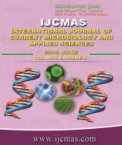


 National Academy of Agricultural Sciences (NAAS)
National Academy of Agricultural Sciences (NAAS)

|
PRINT ISSN : 2319-7692
Online ISSN : 2319-7706 Issues : 12 per year Publisher : Excellent Publishers Email : editorijcmas@gmail.com / submit@ijcmas.com Editor-in-chief: Dr.M.Prakash Index Copernicus ICV 2018: 95.39 NAAS RATING 2020: 5.38 |
1Department of Microbiology, Shri Vasantrao Naik Government Medical College Yavatmal, Maharashtra, India
2Department of Community Medicine, Shri Vasantrao Naik Government Medical College Yavatmal, Maharashtra, India
Dengue infections are currently one of the most rapidly emerging arboviral infections in the world. There is high mortality associated with severe dengue infection so we conducted study to predict various factors indicating severity of dengue infection. This cross- sectional study conducted in tertiary care hospital of central India. Data associated with various clinical features of dengue infection collected in predesigned questionnaire. Patient tested for complete blood count, serum alanine transaminase (ALT), aspartate transaminase (AST) levels, early dengue NS1 capture ELISA (Panbio, Brisbane, Australia) and commercial capture-IgM and IgG ELISA (Panbio, Brisbane, Australia). Total 678 suspected patients for dengue infection included in the study, 128(18.9%) patients were diagnosed as dengue positive, 58(45.3%) patients showed severe dengue infection, 66(51.6%) patients had thrombocytopenia, 38(29.7%) had raised liver enzymes,62 (48.4%) patients had decreased total leukocyte counts. Our study demonstrated various clinical and laboratory parameters to predict severity of the dengue infection which can be used to categorize the patients in resource poor country like India for the management of dengue infection.
 |
 |
 |
 |
 |